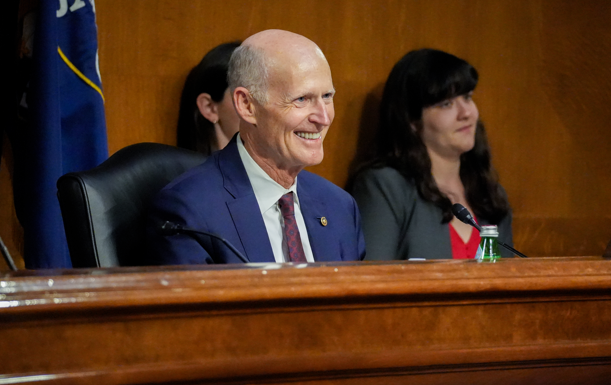VIDEO RELEASE Chairman Rick Scott Holds Aging Committee Hearing on Disaster Preparedness for Aging Americans Ahead of Hurricane Season
WASHINGTON, D.C. – Yesterday, Senator Rick Scott, Chairman of the U.S. Senate Special Committee on Aging, convened a committee hearing focused on the critical issue of disaster preparedness for older Americans entitled, “Preparing for Disasters: Unique Challenges Facing Older Americans." The hearing addressed the pressing need for seniors to be prepared with clear emergency plans ahead of the 2025 hurricane season, which officially begins on June 1, while underscoring the heightened vulnerabilities older adults face during natural disasters and the unique needs of this population.
Chairman Scott’s witnesses for the hearing included Sheriff Chris Nocco of Pasco County, Florida and Jennifer Pipa of the American Red Cross who shared best practices and strategies aimed at better protecting seniors during such crises. Their testimonies served to inform and motivate seniors, communities, loved ones, caregivers, and policymakers to take proactive steps to support preparedness for our aging population before disaster strikes.

Watch Chairman Scott’s full remarks HERE. Read Chairman Scott’s remarks as prepared for delivery below:
“The U.S. Senate Special Committee on Aging will now come to order.
Today, we are gathered to highlight the importance of disaster preparedness.
Natural disasters do not discriminate. It doesn’t matter how old you are, how much money you have, or how smart you think you may be – if you aren’t prepared, nothing else matters.
And while being prepared is vital for EVERYONE – it is especially important for seniors who often have different and more complex needs than their younger neighbors and friends.
As the senior Senator from Florida, I am no stranger to disasters.
Throughout my eight years as Governor and six years serving Floridians in the U.S. Senate, I’ve seen the destruction left behind by multiple devastating hurricanes in the Sunshine State.
If there’s one lesson I’ve learned – it’s that PREPAREDNESS SAVES LIVES.
There is no alternative to getting prepared and having a disaster plan. When disasters strike, the things around us can be replaced, but if you don’t protect your life, there is no second chance.
I tell Floridians constantly during hurricane season: you can rebuild your home, but you can’t rebuild your life.
I cannot tell you how many Floridians I have talked to that barely survived hurricanes and wish they would have done more to be prepared.
I've also talked to heartbroken families that lost a loved one who didn't take these storms seriously.
I’ll never forget talking to a young man in Mexico Beach the day after Hurricane Michael made its devastating landfall there in 2018.
He was frantically searching for his elderly mother, who had stayed in her home on the beach to ride out the storm.
Unfortunately, that young man wouldn’t find his mom until days later. She had been swept away by the massive storm surge and didn’t survive.
It breaks your heart to hear these stories. She should still be alive.
My hope is that our hearing today will motivate older Americans to take disaster preparedness seriously. Hurricane Season is just a few weeks away and being prepared SAVES LIVES.
Being from Florida, it’s no surprise that most of my experience with disasters has come from responding to hurricanes, but it’s not just storms that folks need to prepare for.
We have all seen devastating wildfires, tornadoes, earthquakes and other natural disasters impact our country. We have to remember that disaster can strike at any moment. That is why being prepared and having a plan is so important, especially for our aging population who face unique challenges.
Older Americans are disproportionately affected by natural disasters. In Florida, nearly 60% of the deaths from Hurricane Ian were seniors.
So – if you’re a senior, if you have loved ones who are seniors, or anyone watching this right now, go to READY DOT GOV and see what you need to be prepared and make a plan.
That includes having an evacuation plan and knowing what to do if you must leave your home.
You should also make sure to stock up on emergency supplies like food, water, first aid supplies, and for our seniors especially, a really important part of this is making sure to have medications.
YOU HAVE TO MAKE SURE YOU HAVE A PLAN THAT ENSURES YOU HAVE ENOUGH MEDICINE TO LAST A WEEK.
There are so many things to think about, but when you have a plan in place and get prepared in advance, it is so much easier and less stressful than trying to get everything done with a storm barreling through the Atlantic or Gulf of America.
I am so glad to have the witnesses before us today and have them share their expertise and experience. Listen to them – it very well could be the difference in saving your life should disaster strike.
Don’t put your family and loved ones at risk. Don’t wait to take action. Get prepared TODAY.
Now, I’d like to recognize Ranking Member Kirsten Gillibrand for her opening statement.”
###